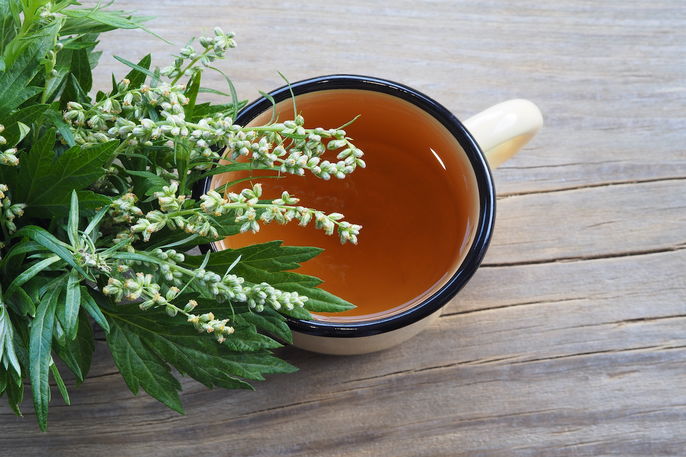Mugwort is a medicinal plant of the Artemisia vulgaris species that is rich in flavonoids, sesquiterpenes and phenolic acids. It has anti-inflammatory, antioxidant, antispasmodic and antiseptic properties and is popularly used to treat problems like irregular menstruation, menstrual cramps and anxiety, for example.
The parts of mugwort that are commonly used are the leaves and flowers. They can be used to prepare tea or make compresses.
Mugwort can be purchased at herbal stores, health food stores or pharmacies. It should be used as directed by a doctor or medicinal health specialist, as it can cause seizures, allergic reactions or miscarriage.

Health benefits
Mugwort has anti-inflammatory, antioxidant, antispasmodic, antiseptic, antimalarial, vermifuge, antihypertensive and liver protective properties. It can be used to treat conditions like:
- Fever or asthma
- Indigestion or stomach pain
- Intestinal cramps or intestinal worms
- Liver or gallbladder diseases
- Muscle pain or rheumatism
- Headache or migraine
- Irritability, depression, anxiety or stress
- Insomnia or chronic fatigue
- Skin lesions
- Epilepsy
Additionally, mugwort has uterine-stimulating properties, which can help to stimulate period flow, regulate menstruation, or relieve cramps.
Some studies [1,2] show that mugwort has substances with anti-inflammatory action, such as artemisinin and cardamonin. These help to reduce inflammation caused by Crohn's disease, which can also help to improve the mood and quality of life of patients with this disease. However, more studies are still needed to support this benefit.
Although it boasts many health benefits, this medicinal plant should not replace medical treatment or be used without the direction from a doctor or medicinal plant specialist.
Properties of mugwort
Mugwort has anti-inflammatory, antioxidant, antispasmodic, antiseptic, antimalarial, vermifuge, antihypertensive and liver protective properties, due to the presence of flavonoids, sesquiterpenes and phenolic acids in its composition.
How to use
The parts of mugwort that are typically utilized are the flowers or leaves, as these contain the active substances from which its medicinal properties are extracted.
1. Mugwort tea
Artemisia tea can be prepared with the flowers or leaves of this plant. This can help treat indigestion, fever, menstrual cramps, intestinal cramps, headache, or anxiety.
Ingredients
- 2 tablespoons of dried mugwort leaves
- 1 liter of boiling water
How to prepare
Place the mugwort leaves in the boiling water and let them steep for 10 minutes. Strain and drink 2 to 3 cups a day.
2. Mugwort compresses
Mugwort compress can be applied on irritated or inflamed skin, but should not be used on open or bleeding wounds.
Ingredients
- 2 tablespoons of mugwort flowers
- 1/2 liter of water
How to prepare
Boil the mugwort flowers and water for 1 minute. Cover and let it rest for about 15 minutes. Then apply it to the affected skin, using sterile gauze or a clean, dry cloth, 1 to 3 times a day.
Possible side effects
The most common side effects of mugwort are overstimulation of the central nervous system, vasodilation, seizure, liver problems, kidney problems, and mental and psychological problems.
Additionally, mugwort can cause miscarriage in pregnant women.
Mugwort can also trigger allergic reactions, sinusitis-like symptoms, and sneezing. It can also trigger dermatitis or blisters on the skin.
Therefore, mugwort should not be used without the guidance of a doctor or medicinal plant specialist.
Contraindications for use
Artemisia should not be used by pregnant women, as it can cause uterine contractions and lead to miscarriage. This plant should also not be used by breastfeeding women.
Furthermore, this plant should not be used by people who are allergic to mugwort or ragweed, chrysanthemum, marigold, daisy, sunflower, birch, celery, carrot, white mustard, honey, royal jelly, hazelnut, olive, latex, peach, apple , kiwi, sage, celery or tobacco.





























